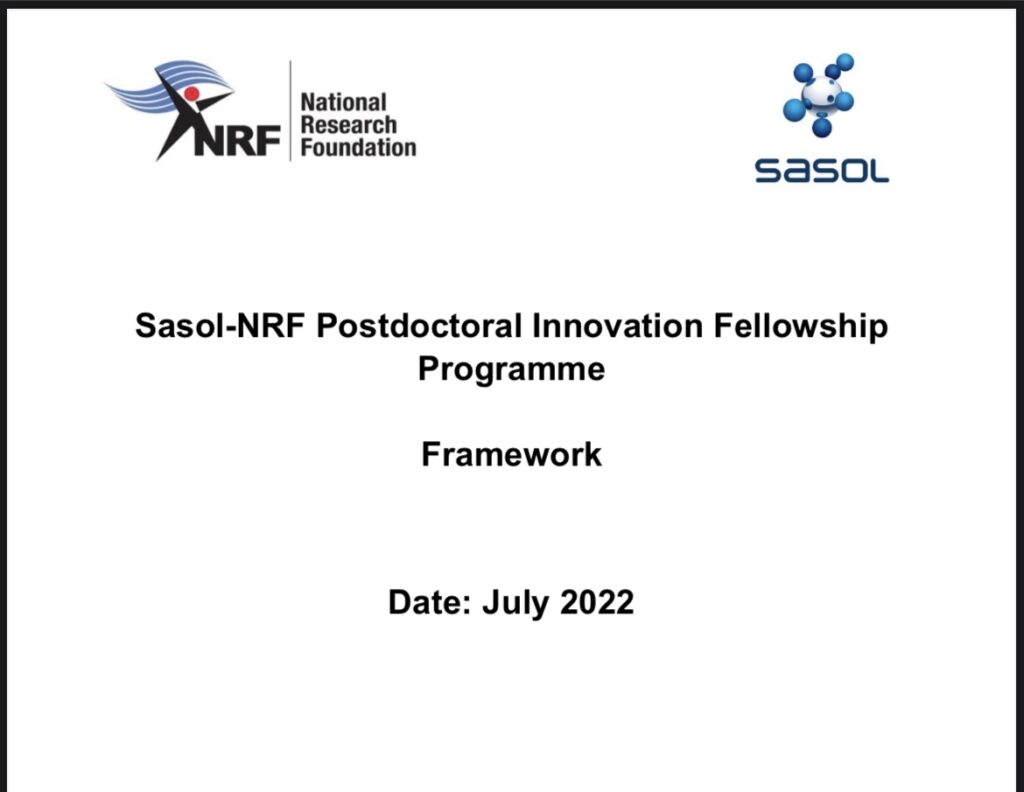
Applicant Closing date: 20 September 2022

The National Research Foundation (NRF) and Sasol are pleased to announce Sasol-NRF Postdoctoral Innovation Fellowships Program. This program is an extension of the Agreement to fund research in energy transition that was reached in December 2021.
The intent of this Fellowships Programme is to develop industrially relevant long-term research capacity in energy transition and sustainability at academic institutions by supporting Postdoctoral Fellows to undertake partnership research and innovation. The successful postdoctoral fellows will undertake research at South African institutions as well as at Sasol’s research facilities in Sasolburg for a period of up to two years.
This is a directed open call for funding ofPostdoctoral Fellows from January 2023. Please read the Framework Guide on Sasol Postdoctoral Innovation Fellows Program (https://www.nrf.ac.za/funding/call-documents/nrf-call-for-proposals-for-funding-in-2022-and-2023/)
Research Focus
The following six themes are targeted for this Call, and funding will be awarded to applicants with proposals that are aligned to one of these themes.
Green Hydrogen
The scope of this theme covers novel approaches across the range of green hydrogen production technologies (electrolysis, thermochemical, photoelectrochemical and photobiological). Projects should seek to find solutions which address critical commercialisation hurdles for green hydrogen production, namely cost effect economics (increased conversion efficiency, lower capital cost), ability to integrate with variable renewable energy sources and safe operation.
Energy Storage
The scope of this theme covers novel approaches within the range of energy storage technologies (chemical, electrical, electrochemical, thermal, gravimetric and mechanical), with a specific focus on applications that can benefit South African-based systems and processes. Consideration should be given to cost-effective economics for sustainable solutions, and could consider integration opportunities with other South African industries.
Waste Utilisation towards a Circular Economy
The scope of this theme covers new or improved waste utilisation concepts, addressing key hurdles standing in the way of commercial deployment. This includes enhancing the recovery of plastic and other wastes for cost effective integration into existing processes, as well as new approaches to the value enhancement of industrial waste which could utilise the existing asset base of typical refinery and chemical value chains.
Air Quality Assessment
The scope of this theme covers studies of the comparability of different dispersion modelling tools such as AERMOD, CALPUFF and SCIPUFF within a level 3 assessment for a nationally relevant scenario. A governing document supplemented by a Code of Practice provides direction for the utilisation of dispersion modelling in South Africa. The primary objective of this Code of Practice is to standardise model applications for regulatory purposes and to make sure that dispersion modelling studies in South Africa are performed on a consistent basis and comparable to ensure that results from one study can be compared directly to those from another.
Fischer-Tropsch Catalysis for Power-to-Liquids Applications
The scope of this theme covers catalyst preparation, characterization and testing in the field of Cobalt-based Fischer-Tropsch catalysts for Power-to-Liquids (PtL) applications. This involves development of novel CO2 hydrogenation catalysts with the aim of combining CO/CO2 and Hydrogen to produce longer chain hydrocarbons. The ultimate goal is to further the understanding of fundamental aspects linked to design and synthesis of suitable PtL catalysts.
In situ Characterisation of Catalysts
The scope of this theme covers fundamental research on the observed changes within nanostructure of catalysts using advanced surface and bulk characterisation techniques. Focus should be on the in-depth fundamental in-situ study of the catalyst surface after exposure to different reaction conditions, employing a combination of complementary techniques to elucidate the structure and determine its relationship with observed adsorption properties and catalytic performance. These studies should be applied to a relevant area of catalysis in the Sustainability or Energy Transition field such as CO2 conversion.
Applications should be submitted no later than 26 September 2022 on the NRF Connect (https://nrfconnect.nrf.ac.za/).





